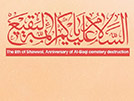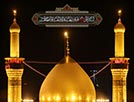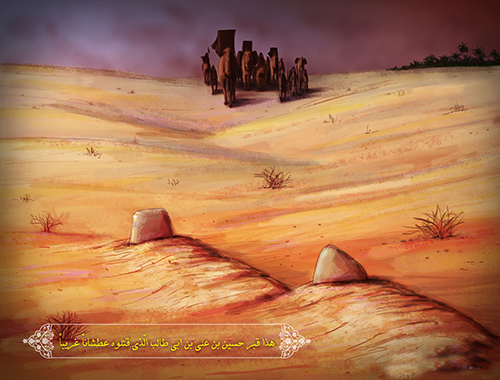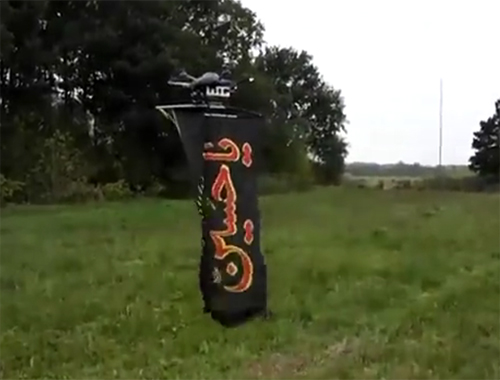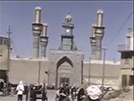Verse249
- Details
- Hits: 2712
Section 33.
Saul's Victory over Goliath.
The religious war of the Israelites - Allah blesses the sincere fighters in His Cause with triumph over their enemies.
(249) فَلَمَّا فَصَلَ طَالُوتُ بِالْجُنُودِ قَالَ إِنَّ اللّهَ مُبْتَلِيكُم بِنَهَرٍ فَمَن شَرِبَ مِنْهُ فَلَيْسَ مِنِّي
وَمَن لَّمْ يَطْعَمْهُ فَإِنَّهُ مِنِّي إِلاَّ مَنِ اغْتَرَفَ غُرْفَةً بِيَدِهِ فَشَرِبُواْ مِنْهُ إِلاَّ قَلِيلاً مِّنْهُمْ فَلَمَّا جَاوَزَهُ
هُوَ وَالَّذِينَ آمَنُواْ مَعَهُ قَالُواْ لاَ طَاقَةَ لَنَا الْيَوْمَ بِجَالُوتَ وَجُنودِهِ قَالَ الَّذِينَ يَظُنُّونَ أَنَّهُم مُّلاَقُوا
اللهِ كَم مِّن فِئَةٍ قَلِيلَةٍ غَلَبَتْ فِئَةً كَثِيرَةً بِإِذْنِ اللّهِ وَاللّهُ مَعَ الصَّابِرِينَ
249. " So when Saul marched out with the troops he said: ' Verily Allah will try you by a river, whoever drinks from it he is not of me, and whoever tastes it not, he is surely of me, including the one who tastes but a single handful.' But they all drank of it, except a few of them. And when he (Saul) crossed it (the river), those who believed with him said: ' We have no power today against Goliath and his troop .' Those who knew that they would meet Allah said: ' How often a small party has overcome a numerous host by Allah's leave! And Allah is with the (steadfast) patient ones '."
* * * *
Commentary:
In this verse, the Qur'an announces the failure of a large group of Israelites in their test when they drank water from the prohibited stream. They did not tolerate the thirst therein. So, they were not successful in that trial
.
" So when Saul marched out with the troops he said: ' Verily Allah will try you by a river, whoever drinks from it he is not of me, and whoever tastes it not, he is surely of me, including the one who tastes but a single handful.' But they all drank of it, except a few of them. And when he (Saul) crossed it (the reiver), ... "
However, the remaining group, who succeeded in the foregoing examination, had another practical examination, too. It was a spiritual examination. When they encountered the great forces of Goliath, they said that they could not fight against that armed force.
" ... those who believed with him said: ' We have no power today against Goliath and his troop .' ... "
But, those who believed in the Resurrection and meeting Allah in the Hereafter, said that victory is in Allah's hand, and it is by His leave that a small group may win a large and numerous troop. It says:
" ...Those who knew that they would meet Allah said: ' How often a small party has overcome a numerous host by Allah's leave! And Allah is with the (steadfast) patient ones '. "
* * * *
Traditions:(1)
"Muhammad ibn Yahya narrated from Muhammad ibn Ahmad from Muhammad ibn Khalid and al-Husayn ibn Sa'id from an-Nasr ibn Suwayd from Yahya al-Halabi from Harun ibn Kharijah from Abu Basir from Abu Ja'far (a.s.) saying in a tradition, inter alia: " And Allah reports the words of Talut: 'Surely Allah will try you with a stream; whoever then drinks from it, he is not of me, and whoever does not taste of it, he is surely of me.' But all of them drank from it, except three hundred and thirteen men, among them were those who took a handful of water as well as those who did not drink at all. When they went out against Goliath, those who had taken handful of water said, ' We have today no power against Goliath and his forces'; and those who had not taken it said, 'How often has a small party vanquished a numerous host by Allah's permission, and Allah is with the patient ones.' " (al-Kafi) The author ('Allamah Tabataba'i) says: That there remained with Talut only three hundred and thirteen men (equal in number to the Muslim 'army' in the battle of Badr) is mentioned in numerous traditions from Shi'ah and Sunni chains. The details that those who said: " We have today no power... " were those who had taken a handful of water, and those who said, " How often a small party... " were those who had not tasted it at all, may be inferred from the position of the exceptional clause in the verse, ... . "
(1) Al-Mizan, commentary, vol. 4, p. 123 (English Version), by al-'Allamah as-Sayyid Muhammad Husayn at-Tabataba'i

